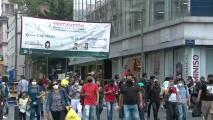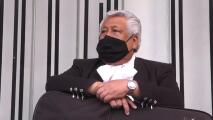Activists call for an end to violence against women in El Salvador

SAN SALVADOR - "We are not here to celebrate, we are here to demand that the law that criminalizes abortion be modified, because we want to live. We are here to claim our rights, [we are here] on behalf of women living in a patriarchal society and to protest against unfair legislation."
That's how women's rights activist Sara García, of El Salvador's Citizens Group for the Decriminalization of Abortion , summed up the reasons why Salvadorans took to the streets to march in the capital on Thursday, March 8, International Women's Day.
Early estimates indicate that some 3,000 people came out to protest. They had a range of motivations: to call for an end to gender-based violence, and to protest discrimination and unequal treatment. They're also pushing for the release of a number of women who have been imprisoned on charges of homicide after suffering what they say were obstetric complications during pregnancy or childbirth.
In El Salvador women face huge challenges. High numbers of girls and young women are victims of sexual violence that often begins in their own homes. Many of them become mothers at a young age, which has a high social and economic cost.
Who suffers the worst consequences? Poor women.
April 30: deadline
This year's march comes as public support has grown for two bills that call for the decriminalization of abortion under certain conditions, such as when the health and life of the mother is in danger, when the fetus has no chance of survival outside the womb, and when the pregnancy is the product of rape, incest, or sex trafficking.
Legislators have until April 30 to vote on the bills. But despite huge public support, it remains unclear whether legislators can pass the measures.
Elections last weekend saw the defeat of a number of leftist politicians. That leaves the right-wing ARENA party in the majority, whose policies are extremely conservative. In 2016, one ARENA parliamentarian introduced a bill to increase the maximum penalty of abortion from eight to 50 years—the same as aggravated homicide.
"Teodora is free, come look!"
Marching in the front of the crowd Thursday was Teodora del Carmen Vásquez, who was released from prison just three weeks ago after serving 10 years of a 30 year sentence. In July 2007, she was charged with aggravated homicide after her baby was born dead.
Vásquez was nine months pregnant and expecting when she says she began to feel ill at the school where she worked as a cook. She called 911 to report a pain that she thought indicated she was in labor. Hours passed, the pain got worse, and the ambulance never arrived. After she felt the urge to go to the bathroom, she hovered over the toilet and passed out. She remembers only fragments of what happened next.
When police arrived, they say they found her baby in the toilet bowl, lifeless. Vásquez was lying in a pool of blood.
Vásquez is one of dozens of women who have been sentenced to harsh sentences in the last two decades in El Salvador on charges of aggravated homicide: prosecutors accuse them of killing their babies, but they insist that their newborns were born dead or died shortly after childbirth.
"I feel very happy," she told Univision. "I am very happy to participate and to know that we are fighting for women who are still imprisoned."
Reporting for this story was supported by the International Women’s Media Foundation and The Women's Equality Center.



